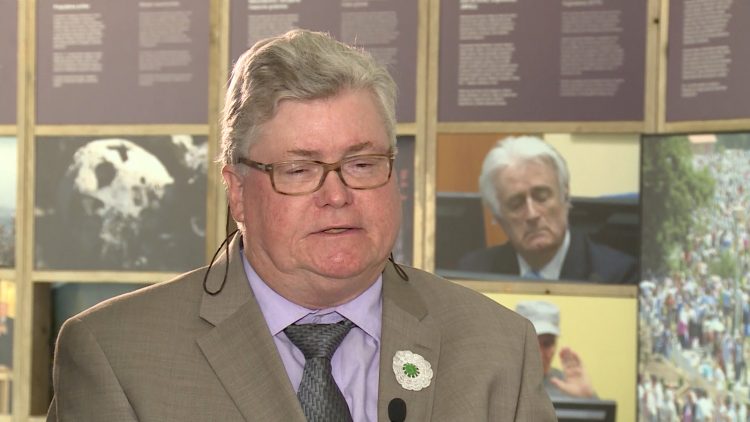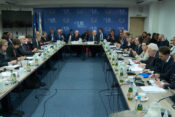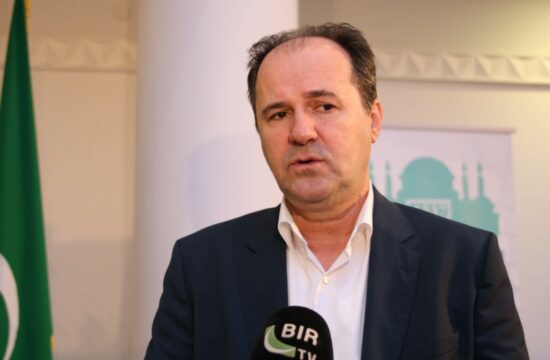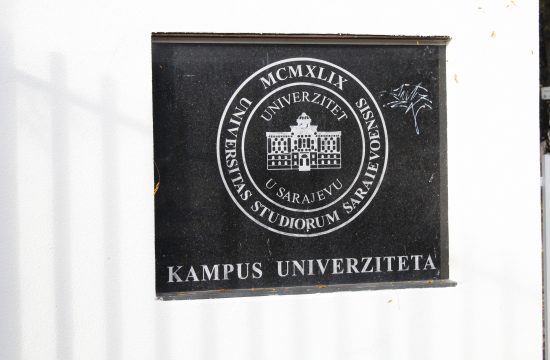
Analyzing the legacy of the Dayton Peace Agreement signed 25 years ago, a U.S. scholar reminded on Sunday that the negotiators were also Serbia and Croatia, countries that orchestrated the aggression against Bosnia and Herzegovina and that later kept undermining the agreement, suggesting steps that should be made to fix this.
Dr. David Pettigrew, Professor of Philosophy at Southern Connecticut State University (SCSU) and member of the Steering Committee of the Yale University Genocide Studies Program said at a session of the Circle 99, a weekly meeting of Bosnia’s intellectuals in Sarajevo, that rulings of the war crimes court in The Hague have identified Serbian and Croatian citizens who have participated in the joint criminal enterprise responsible for the aggression.
Some of the participants were later indicted or convicted of genocide, he said, naming Slobodan Milosevic, who was indicted or his role in the execution of the “Greater Serbia” plan and Zdravko Tolimir and Momcilo Krajisnik who were convicted of war crimes, including genocide.
On the Croatian side, Pettigrew reminded that in Bosnian Croat Jadranko Prlic’s ruling, the court included Croatian citizens whose goal was to permanently remove the Muslim population from Herzeg-Bosnia, a part of the country that Croatia supported in its efforts to secede.
“Despite the fact that they were finally linked to joint criminal enterprises, both (former President Franjo) Tudjman from Croatia and Milosevic from Serbia have in 1995 signed the Dayton agreement,” he said.
“Therefore, the problematic composition of the negotiating team could have hinted at serious limitations of this exceptionally poor peace agreement. We should not be surprised about the fact that in the years following the Dayton agreement, Croatia and Serbia have tried to undermine Bosnia and Herzegovina as a sovereign state,” he added.
Pettigrew argued that those two countries did this by encouraging separatistic initiatives of Herzeg-Bosnia and Bosnia’ semi-autonomous Republika Srpska (RS) entity, this way pursuing their wartime territorial aspirations and their nationalistic and anti-Muslim propaganda. The professor identified Republika Srpska as an internal source of destabilisation.
“The founders of Republika Srpska have conducted an aggression against the civilian population of Bosnia and Herzegovina from 1992 until 1995. Despite their genocidal crimes, the Bosnian Serbs were ‘rewarded’ with a recognition of Republika Srpska which was legalized as an entity within Bosnia and Herzegovina – an entity that would over the next 25 years undermine the sovereignty of Bosnia and Herzegovina,” Pettigrew said.
He blamed the RS authorities for preventing refugees from returning with threats, genocide denial and glorification of war criminals in order to maintain ethnic homogenization.
Pettigrew mentioned monuments that have been erected to glorify war criminals and plaques honouring people like Radovan Karadzic and Ratko Mladic.
“For the perpetrators, these monuments have the effect of a colonization of the cultural landscape with a revisionalist narrative, a narrative that influences the next generation, which can be observed in the statements of the new Banja Luka mayor, Drasko Stanivukovic, who is denying the genocide and rejects the rulings of the Hague tribunal,” the Professor said.
Meanwhile, Bosnian Serb leader Milorad Dodik is undermining the existence of Bosnia and Herzegovina with his rejections of the state court, his threats with secession and his ridiculing of Bosnia’s international administrator, he said.
“The Republika Srpska leadership is trying to prevent Bosnia and Herzegovina from functioning as a state, is undermining any hope for restorative justice that could lead towards reconciliation through its genocide denial and its glorification of convicted war criminals. That too is a part of the Dayton agreement's tragic legacy,” he said.
The agreement is a testimony to the failure of the international community to recognize and end a genocide which developed from 1992 until 1995, the failure to achieve a just peace in Dayton and the failure to support the building of a state of Bosnia and Herzegovina over the past 25 years, Pettigrew concluded.
The international community should face this tragic legacy, he said, and have the international administrator use his sweeping powers to impose a law that would ban the glorification of war criminals and the denial of genocide, the Professor suggested.
“This would be important for the survivors who are being traumatized by these threatening and dehumanizing acts,” he said.
“Genocide denial is an act of hatred and discrimination because it plays down and justifies barbaric crimes a target group has survived. Not only does it play down the crimes but also the suffering, so that the denial carries with it the threat of a repetition of the crime,” Pettigrew explained.
Bosnia's international administrator should also with this law allow the survivors to erect their monuments on sites where the crimes were committed, such as the concentration camps Trnopolje, Omarska and the city of Visegrad, all places where local Serb authorities have banned such plaques. Monuments glorifying war criminals should be removed, he said.
The power of the international administrator should be used to reform the election law so that it allows those who were removed by a genocide and their children to vote in municipalities they were expelled from and the international community should confront the destablilization efforts and threats with secession, he suggested.
The EU and NATO should create a shortcut for Bosnia and Herzegovina’s accession and all of those steps together should be priorities in order to solve the tragic legacy of Dayton and “support the building of a state which is late but which would ensure a framework for constitutional changes and a better future for the next generation of Bosnia and Herzegovina,” he said.







